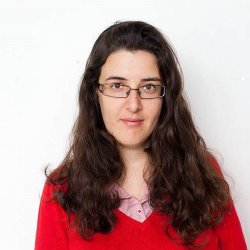[ad_1]
By Donald Gilpin

Elizabeth Tsurkov
Elizabeth Tsurkov, a Princeton University graduate student who is an Israeli-Russian dual citizen, has been missing in Iraq for several months and is being held by the Iran-backed Shiite militia Kataib Hezbollah, according to an announcement last Wednesday from Israeli Prime Minister Benjamin Netanyahu’s office.
A Ph.D. candidate in the Princeton Department of Politics, Tsurkov was in Iraq conducting research for her dissertation when she was abducted in Baghdad in March.
“Elizabeth Tsurkov is still alive and we hold Iraq responsible for her safety and well-being,” the Israeli prime minister’s announcement stated. Her whereabouts remain unknown, but the announcement added that she visited Iraq “on her Russian passport, at her own initiative pursuant to work on her doctorate and academic research on behalf of Princeton University.”
The Iraq government reported on July 7 that it had initiated an investigation into the kidnapping and was awaiting the results of that investigation.
“Elizabeth is a valued member of the Princeton University community,” said University Assistant Vice President for Communications Michael Hotchkiss in a statement. “We are deeply concerned for her safety and well-being, and we are eager for her to be able to rejoin her family and resume her studies.”
He continued, “We don’t have other information to share at this time. It is the University’s general policy to maintain the confidentiality of student records, consistent with applicable student privacy laws such as FERPA, and out of consideration for student privacy and safety.”
Tsurkov is a fellow at the New Lines Institute for Strategy and Policy, a Washington, D.C.-based research group, and a contributor to the New Lines Magazine, as well as a research fellow at the Forum for Regional Thinking, an Israeli-Palestinian research organization based in Jerusalem.
Fluent in English, Hebrew, Russian, and Arabic, she has written extensively about Syria, and has also conducted fieldwork in Jordan, Iraq, Turkey, and other countries in the region.
“My research is informed by the desire to understand and convey the points of view and experiences of people in the Middle East, and highlight abuses by powerful actors, whether they are dictatorial regimes, armed groups, or foreign countries intervening in the region,” Tsurkov wrote on her website.
“I have over a decade of experience in volunteering and working for human rights organizations in the Middle East fighting for the rights of Palestinians, refugees and migrants, torture survivors, human trafficking victims, and ethnic and religious minorities,” she continued.
A July 5 article in New Lines Magazine called for “America’s every effort to bring her to safety,” noting that Israel, Iran, and Russia were likely to be the major players involved in negotiating her release.
The New Lines article pointed out that “Liz’s research is heavy on political science, and her fieldwork in the Arab world poses no threat to anyone,” but added that her Israel citizenship may have placed her at risk in Iraq. It praised her “drive and empathy,” and her “outstanding” work. “Many who follow her work know that she is deeply passionate about the region and empathetic toward its people,” the article stated.
New Lines’ last contact with Tsurkov was on March 19 when, they reported, she stated that she had finished her fieldwork and was planning to return to Princeton to write her dissertation. Soon after that, New Lines learned that she had been kidnapped, but “out of respect for her family’s wishes and the chance that this might be resolved with her quick release,” they chose not to publicize the abduction until last week. They have continued to seek more information.
Another Princeton University doctoral student, Xiyue Wang, was held in Iran for three years after his arrest in 2016 on charges of espionage while he was doing research in Iran. Wang returned to the United States in 2019 in a prisoner exchange for an Iranian scientist accused of violating trade sanctions.
In 2021 Wang and his wife Hua Qu sued Princeton University, claiming “reckless, willful, wanton, and grossly negligent acts” before and during his imprisonment and alleging that the University encouraged him to travel to Iran despite safety concerns.
Meanwhile, Evan Gershkovich, a Wall Street Journal reporter who grew up in Princeton, remains incarcerated in Moscow’s Lefortovo prison. He was detained in Russia on March 29 of this year on espionage charges.
Gershkovich, a 2010 Princeton High School graduate, has pleaded not guilty to all charges, and the Wall Street Journal has strongly denied all allegations. The White House has confirmed that there have been discussions about a possible prisoner swap, but there has been no specific news of progress in negotiations.
[ad_2]
Source_link


